OpEd: Jack
Not only no but hell no.... Turkey appears to be seeking the restoration of the old Ottoman Empire. Ancient History 101 gives a prime example why Islam should always be criticized..it is not a religion it is actually a 7th Century Theocracy..still stuck in 7th Century philosophy and barbarism...Sharia Law should be banned in all countries world wide
http://www.thereligionofpeace.com/Pages/History.htmThe Life of
Muhammad:
An Inconvenient Truth
~~~~~~~~~~~~~~~~~~~~~~~~~~~~~~~~~~~~~~~~~~~~~~~
by Michael Carl

Turkish Prime Minister Recep Tayyip Erodgan, who just days ago said a
movie that “insults religions” and “prophets” is not protected by
freedom of speech, now is insisting that international bodies pass laws
making criticism of Islam a crime.
The Turkish newspaper,
Today’s Zaman, reported Erdogan made the comments before a large crowed in Bosnia.
He said he is the “prime minister of a nation, of [whom] most are
Muslims and that has declared anti-Semitism a crime against humanity.
But the West hasn’t recognized Islamophobia as a crime against humanity –
it has encouraged it.”
He provided the comments in response to the growing controversy
surrounding the YouTube movie, “Innocence of Muslims,” allegedly made by
an Egyptian living in the United States.
Attorney, writer and independent foreign policy analyst Andrew Harrod
said Erdogan’s statement is illogical because he is comparing prejudice
against an ethnic group or race with prejudice against a group for
holding to a specific set of beliefs.
“This is an absurd proposition. Intellectual claims simply have no
boundaries, such that conflicting ideas demand testing in order to
determine which one is right,” Harrod said.
Harrod added that others, including Jihad Watch Director Robert
Spencer, have observed that the American-made film is the pretext for a
coordinated campaign to pressure free societies on issues such as
freedom of speech in the name of criticizing Islam.
“Leaders like Erdogan are trying to put a logical, pro-Western face
on their campaign to suppress speech, and thus are making various
arguments to make their agenda sound like an advancement of human
rights,” Harrod said.
ACLJ International Director Tiffany Barrans said Turkey is one of the
leaders in a move to get international bodies to adopt a Pakistan-like
law prohibiting the criticism of Islam.
“Turkey is among a number of countries, including Pakistan and
Indonesia, that will likely continue to push for the creation of a new
international law limiting one’s right to freely speak should that
speech somehow defame or insult a religious theology,” Barrans said.
Raymond Ibrahim, Middle East analyst and fellow with the Middle East
Forum, said Erdogan is following a familiar script among Middle East
leaders.
“Erdogan is basically doing what other Muslim leaders do: talk about
what the West ‘needs’ to do, followed by much illogical talk,” Ibrahim
said.
“For example, the assertion ‘Freedom of thought and belief ends where
the freedom of thought and belief of others start.’ In fact, the one
civilization that finds it especially difficult to live up to this
assertion is Islam, which habitually encroaches on the freedom of
thought and belief of others,” Ibrahim said.
Erdogan and other Muslim leaders, he said, are “banking on the idea
that the softer and more naive elements of the West will fall for such
talk.”
Harrod said that the film is an excellent attention-getting device to push the Islamic agenda.
“Leftist multicultural elements around the world might buy into this,
and thereby enervate the free societies of the world,” Harrod said.
Barrans said that, ironically, laws prohibiting some forms of
religious speech usually hurt the people they were allegedly designed to
protect.
“International human rights standards derive from the inherent
dignity of humankind as individuals. What is clear is that these
blasphemy laws are extremely troubling by placing minorities – those
whom human rights laws are designed to protect – at risk,” he said.
Barrans predicted the United Nations will be the venue for the debate.
“In light of the recent demonstrations and attacks in the name of
Allah, it is likely that the United Nations will see a renewed push for
[a] Defamation of Religions resolution,” Barrans said.
But he added that any move for a “defamation law” should be rejected.
“This push should be emphatically rejected by those who wish to
preserve freedom of expression and open dialogue and debate about
religion,” Barrans said. “All nations that respect religious freedom and
freedom of expression should take a strong stance against any push for a
Defamations of Religions resolution.
“A person’s right to freedom of expression, even expression that
might be deemed offensive, is considered a ‘cornerstone right’ without
which other rights fall into jeopardy,” Barrans said.
Islamic nations already for years have been pushing in the U.N. for a
“Defamation of Religions” law that came out of an original plan by the
Organization of the Islamic Cooperation for a “Defamation of Islam” law
to crack down on criticism of that religion.
Jay Sekulow of the
American Center for Law and Justice said it’s nothing “more than an effort to achieve special protections for Islam – a move to stifle religious speech.”
Critics of the idea say Muslim nations would simply use it as an
endorsement of their attacks on Christians for statements as simple as
their belief in the divinity of Jesus Christ, which Muslims consider an
affront.
Turkey has become a stronger voice in the Middle East, and WND
reported in September 2011 that Turkey was setting up a confrontation with Israel.
Analysts were warning the U.S. and Israel about the instability they
see in Turkey, where Erdogan has called Israel the biggest impediment to
Middle East peace. He has demanded Israel apologize for defending
itself and has suggested his nation’s military might enable blockade
runners to move against Israel’s weapons blockade of the Gaza Strip.
The American Enterprise Institute’s Middle East analyst, Michael
Rubin, said Turkey’s actions and closer alignment with the Islamic world
in recent days demonstrate that Turkey is not a good fit for the
freedom-focused North Atlantic Treaty Organization, of which it is a
member.
“While Turkey was an important Cold War ally, increasingly Turkey has
become a liability to the United States and NATO,” Rubin said.
WND reported in March 2010 that former PLO operative turned Christian
anti-terrorism analyst Walid Shoebat warned that Turkey was emerging as
the world’s growing Islamic power.
Shoebat said the United States needs to be watching not Iran, Syria
or even Hamas and Hezbollah as closely as it needs to follow the actions
of the Islamic leaders of Turkey.
It was just a few months ago when Joseph Farah’s G2 Bulletin reported Turkey appeared to be seeking the restoration of the old Ottoman Empire.
The report said Turkey’s increasing lack of interest in the European
Union combined with its efforts to re-establish its influence in Turkic
countries of Azerbaijan, Kazakhstan, Kyrgyzstan, Turkmenistan and
Uzbekistan and its outreaches to Russian, Syria and Iran were cause for
concern.
Earlier this week, United Nations Secretary-General Ban Ki-moon told
reporters in New York that “free speech” has limits, especially when
religious beliefs are involved.
Referencing the controversy over the movie, he said: “All of this
freedom of expression should not be abused by individuals. … Some people
abuse this freedom. This effort to provoke, to humiliate others by
using (religious) beliefs cannot be protected in such a way.
“All human beings have inalienable rights, freedom of expression,
freedom of assembly, but at the same time, freedom of expression should
not be abused by individuals,” he said.
WND also reported when one of the world’s most influential Muslims
began calling on the United Nations to impose international restrictions
on free speech, criminalizing any statement that impugns Islam.
Sheik Abdullah Bin Bayyah, a professor at King Abdul Aziz University
in Saudi Arabia, is a member of several international organizations,
including the Centre for Studying the Aims of Shariah in the U.K. He
also is the vice chairman of the International Union of Muslim Scholars.
The Royal Islamic Strategic Studies Centre ranked bin Bayyah No. 31
on its list of the 500 most influential Muslims in the world for 2011.
In
a public declaration
issued to several Islamic bodies, including the All Dulles Area Muslim
Society, one of the largest Muslim mosques in the D.C. metro area and
the U.S., bin Bayyah called upon “people of reason and understanding” to
put a legal stop to statements that would offend Muslims and thereby
threaten world peace.
“We ask everyone to ponder the ramifications of provoking the
feelings of over one billion people by a small party of people who
desire not to seek peace nor fraternity between members of humanity,”
bin Bayyah wrote. “This poses a threat to world peace with no tangible
benefit realized. Is it not necessary in today’s world for the United
Nations to issue a resolution criminalizing the impingement of religious
symbols? We request all religious and political authorities, as well as
people of reason to join us in putting a stop to this futility that
benefits no one.”








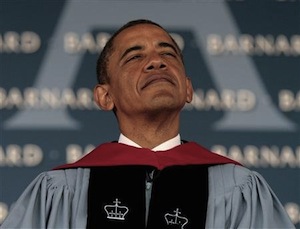




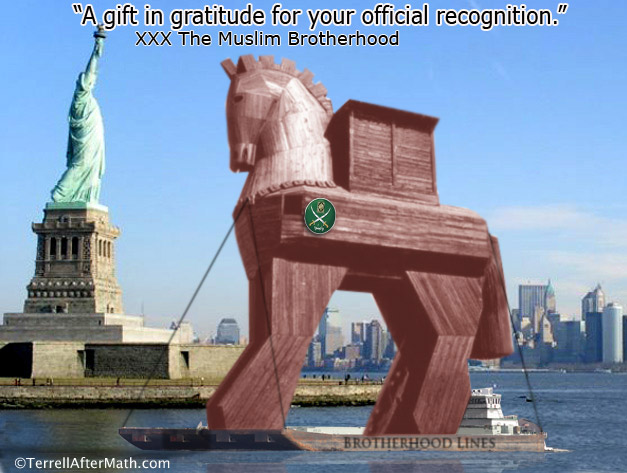





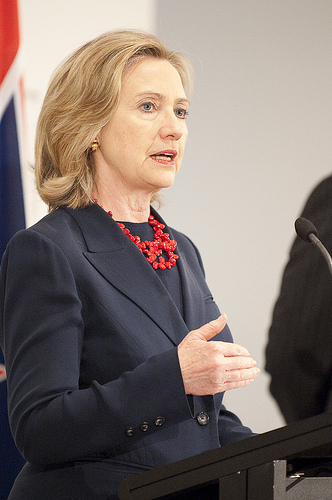
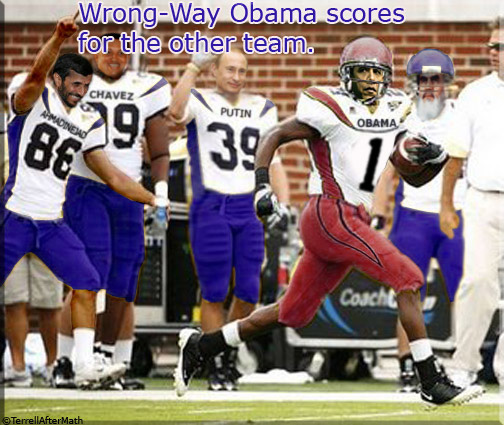
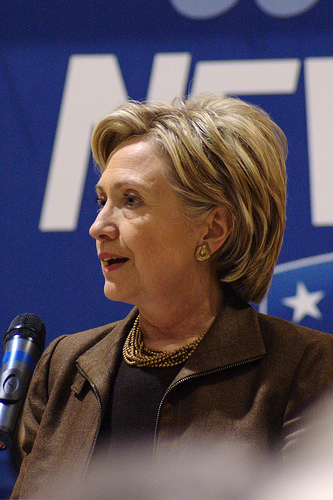






 Check out her site for all the latest:
Check out her site for all the latest: 